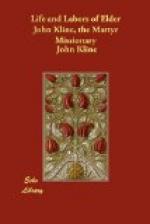A wrong interpretation of many passages in the Bible tends to foster this impression. I will here quote a few passages of this kind, and then interpret them according to what I believe to be the truth. When the children of Israel were about ready to cross the Jordan over into the land of Canaan, Moses said to them: “Remember, and forget not, how thou provokedst the Lord thy God TO WRATH in the wilderness.... Also in Horeb ye provoked the Lord TO WRATH, so that the Lord WAS ANGRY with you, to have destroyed you.” Deut. 9:7, 8.
The Old Testament abounds with passages of similar import, and many are found in the New Testament. But let us examine carefully the kind of wrath and anger to which the Lord may be provoked. It cannot be such wrath as men and devils feel. In Rev. 12:12 we read these words: “The devil is come down unto you, having great WRATH, because he knoweth that he hath but a short time.”
We can not, we dare not, think for a moment that the word wrath, when spoken of God, means the same as when spoken of the devil. The devil’s wrath implies a feeling in him to do all the evil and mischief he can. But the wrath of God cannot mean anything like this; because, when his wrath burns the fiercest, he is still ever ready to forgive all who repent and turn from evil. Nay, he even entreats and beseeches men to be reconciled to him, that his anger may be turned away. I might quote many passages in proof of this. I have time to give but one from the Old Testament. When the Lord made an end of laying before the children of Israel the blessings and the curses, he wound up all by saying: “And there shall cleave naught of the cursed thing to thine hand: that the Lord may turn from the fierceness of his anger, and show thee mercy, and have compassion upon thee, and multiply thee, as he hath sworn unto thy fathers; when thou shalt hearken to the voice of the Lord thy God.”
An appeal to the light of reason must convince any unprejudiced mind that our heavenly Father is angry and wrathful toward no one, in the sense of willing evil to him, or of seeking an opportunity to do him mischief. Men may, and no doubt often do, have this feeling; but it is a wicked feeling. Perish the thought of such wrath ever having a place in the heart of our heavenly Father. The Apostle Peter says: “The Lord is long-suffering toward us, NOT WILLING that ANY SHOULD PERISH, but that all should come to repentance.”
But let us crown all this argument with the Lord’s sunrise upon the night of Nicodemus. Here it is: “God so loved the world,”—the very worst, and wickedest, and most depraved and abandoned part of it; he made no exceptions—“that he gave his only begotten Son, that WHOSOEVER believeth on him should not perish, but have everlasting life. For God sent not his Son into the world to condemn the world; but that the world through him might be saved.”




